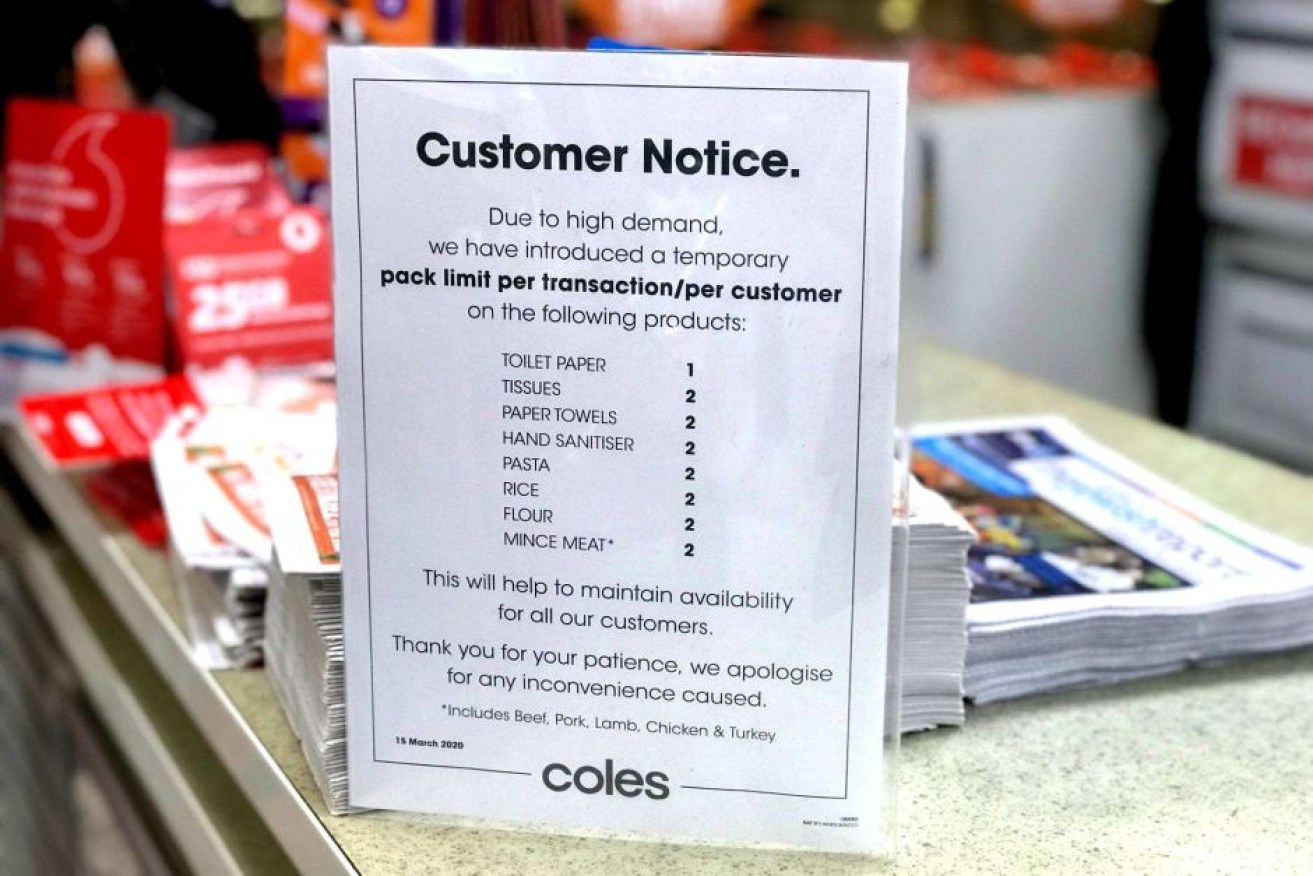Coronavirus is causing panic-buying, but what does that mean for Australia’s food security?

During Victoria's first lockdown in March, supermarkets were forced to put limits on certain products to prevent panic buying. That has happened again as Victoria began Stage 4 restrictions on August 2. Photo: ABC
Empty supermarket shelves have become a common sight in the past few weeks, since coronavirus sparked widespread panic-buying.
After initial limits on toilet paper and hand sanitiser purchases, major retail chains have started to impose restrictions on purchases of some foodstuffs including pasta and rice.
Retailers have suggested the current level of stockpiling is potentially unprecedented in Australia’s history.
In addition to fights over toilet paper, stores have been so busy there have been queues to get in.
Adelaide supermarket chain owner Roger Drake said the weekend just gone had been the most frantic he could recall, and that he had “never” seen anything like it “in 50 years of retailing”.
“We were just staggered. We could not believe it,” he said.
But despite the surge in sales, experts are also offering reassurance that the nation’s underlying food security is not under threat.
“We’re certainly not running out of food,” National Farmers Federation chief executive Tony Mahar said.
“Australia, by and large, has very little to worry about in terms of food security.
“There’s lots to go around … there’s certainly no shortage of wheat for pasta.”
Will coronavirus affect agriculture?
One of Australia’s national strengths is that it is a major food producer, and much of what we eat is home grown.
According to the National Farmers Federation, imported food only accounts for 15 per cent of daily supply.
About two-thirds of Australia’s produce is exported, meaning we make plenty more than we actually consume, and for farmers it’s pretty much business as usual.
“I don’t think we’re ever going to encounter a genuine food crisis where we run out of food and groceries,” Queensland University of Technology retail expert Gary Mortimer said.

Australia is well placed to deal with any global supply issues. Photo: Getty
“When you start to think about a normal supermarket, and you go through each category, each department, you start to realise that the majority of our food and groceries are actually produced or manufactured here in Australia.”
Professor Mortimer said the only other time in recent years there had been such “significant disruption to spending across the board” was during the late 1990s, when fears abounded about the millennium bug, aka Y2K.
“Australians may [also] have encountered shortages of some sort … in North Queensland where we have tropical cyclones,” he said.
“You see a little bit of panic-buying to stock up on bottled water and dry groceries and things like that. Sometimes the shelves run a bit bare then.”
As farmers prepare for their next crop, Mr Mahar said there were no concerns around grain availability, and that reserves were strong.
But the federal government’s announcement that all people arriving in Australia, including citizens, must self-isolate for a fortnight could have implications for agricultural workers.
“In the horticulture, pork and some other sectors, there is a large level of foreign labour that’s used, whether they’re backpackers or Pacific Islanders, seasonal workers,” Mr Mahar said.
“We’re starting to have those conversations around making sure we’ve got flexibility in that labour supply so we can get those products off the trees.”

The NFF says new federal restrictions could disrupt labour supply. Photo: Getty
Could rationing ever be reintroduced?
During World War II, federal restrictions were imposed to control access to essential goods including petrol and food.
At the time, Australia was regarded as a giant food basket providing vital supplies to its allies, and many Australians accepted the restrictions without too much grumbling.
“Starting in 1942, certain foodstuffs were officially rationed,” Melbourne-based food historian and author Jan O’Connell said.
“They principally were tea, sugar, butter and meat.
“Rationing didn’t end completely until 1950.
“[Tea] was the one that was probably most keenly felt by Australians because, at that time, the average Australian drank about 10 cups of tea a day.
“That was done on a coupon system, all that rationing.
“I think people accepted it because it was wartime.
“It was their patriotic duty to do their bit at home.”
But Ms O’Connell said it was extremely unlikely for that to ever be repeated.
“I think it would be very difficult for a government to reintroduce rationing on a large scale today because I think we have become much more self-interested,” she said.
With regard to the current panic-buying Ms O’Connell said she hoped that in six months’ time “we’ll be looking back thinking how silly we all were”.
Mr Mahar echoed that sentiment.
“If people keep calm, keep a measured approach and take what they need, the supply chain is capable of responding to it.”








